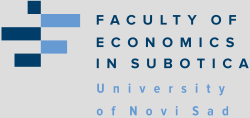REFRAMING TYPES OF UNCERTAINTY AS A STARTING POINT FOR EFFICIENT DECISION MAKING
DOI:
https://doi.org/10.46541/978-86-7233-416-6_15Keywords:
uncertainty, decision making, knowledge, contingency, complexity, radical uncertainty, effectuation, causationAbstract
Purpose: Mangerial decision-making situations are often confronted with uncertainty in terms of underlying causes and predictable effects. However, overlapping definitions and conflicting operationalization of the uncertainty construct make it difficult to deliberately face different types of unceratinby with specific decision-making strategies. The paper aims at delineating types of uncertainty along specific knowledge contexts to enable the choice of suitable strategies for specific decision-making situations.
Design/methodology/approach: In a literature review, concepts of (un)certainty based on (im)perfect information and objectively/ subjectively available configurations of knowledge are discussed and revised.
Findings: The paper develops a framework comprising differentiated states of available information and knowledge applicable to decision-making situations. To unburden the uncertainty concept from conflicting definitions and heterogeneous operationalization, the umbrella-term contingency is introduced. It overarches all states of (im)perfect information and various configurations of knowledge. Finally a framework is presented that delineates different levels of contingency by distinguishing between certainty, risk, uncertainty in the narrowest sense [i.n.s.], complexity, ambiguity/ equivocality and isotropy/ radical uncertainty.
Research limitations/implications: A holistic understanding how to deal with and solve contingency requires further research focusing on aligning levels of contingency with strategies for decision making (algorithms, causation, effectuation, bricolage, improvisation, trial & error) by taking types of knowledge and contextual factors (i.e., time, resources) into account.
Practical implications: Based on the findings, decision-making situations can be clarified in terms of their level of contingency and appropriate strategies to reduce contingency can be developed.



